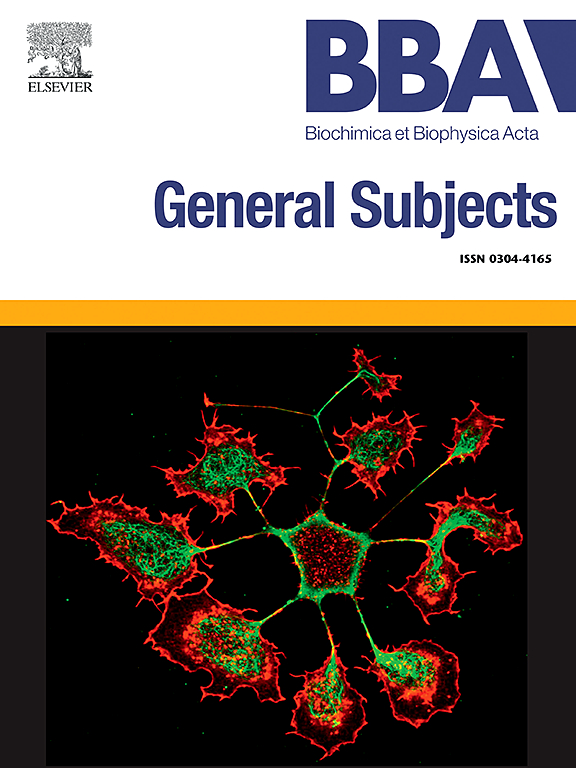MicroRNA-6069 ASO通过PLEKHO1抑制肝细胞癌生长
IF 2.2
3区 生物学
Q3 BIOCHEMISTRY & MOLECULAR BIOLOGY
Biochimica et biophysica acta. General subjects
Pub Date : 2025-02-15
DOI:10.1016/j.bbagen.2025.130774
引用次数: 0
摘要
肝细胞癌(HCC)是全球癌症相关死亡的主要原因。而由于肝癌的早期诊断率较低,很多患者错过了手术切除的最佳时机,因此有必要寻找新的治疗靶点。本研究探讨了microRNA-6069 (miR-6069)在HCC发病机制中的作用。我们分析了miR-6069在TCGA-LIHC队列中的表达,发现与邻近正常组织相比,肿瘤组织中miR-6069的表达显著上调,并在人体组织中进行了验证。MiR-6069反义寡核苷酸(ASO)在体外有效抑制肝癌细胞增殖,在不影响体重的情况下抑制裸鼠皮下肝癌肿瘤生长。通过生物信息学分析和免疫组化,我们发现PLEKHO1是miR-6069的靶点,其表达与miR-6069表达呈负相关。此外,通过免疫组织化学染色、定量PCR (QT-PCR)和Western blot (WB)分析,我们发现miR-6069 ASO干预后,PLEKHO1在裸鼠肿瘤中的表达显著增加,并影响AKT/PI3K信号通路下游分子的表达。这些发现提示miR-6069可能通过调节AKT/PI3K信号通路影响HCC增殖。这些发现强调了miR-6069是HCC治疗中有希望的治疗靶点。本文章由计算机程序翻译,如有差异,请以英文原文为准。
MicroRNA-6069 ASO inhibits the growth of hepatocellular carcinoma by PLEKHO1
Hepatocellular carcinoma (HCC) is a leading cause of cancer-related mortality worldwide. And due to the low early diagnostic rate of liver cancer, many patients miss the optimal time for surgical resection, so it is necessitate to identificate the novel therapeutic targets. This study investigates the role of microRNA-6069 (miR-6069) in HCC pathogenesis. We analyzed miR-6069 expression in the TCGA-LIHC cohort, revealing significant upregulation in tumor tissues compared to adjacent normal tissues, and verified it in human tissues. MiR-6069 antisense oligonucleotide(ASO) effectively inhibits HCC cell proliferation in vitro and suppresses subcutaneous HCC tumor growth in nude mice without affecting their weight. Through bioinformatics analysis and immunohistochemistry, we identified PLEKHO1 as a target of miR-6069, and its expression is negatively correlated with miR-6069 expression. Furthermore, using immunohistochemical staining, quantitative PCR (QT-PCR), and Western blot (WB) analysis, we observed that the expression of PLEKHO1 significantly increased in the tumors of nude mice following miR-6069 ASO intervention, and affecting the expression of downstream molecules in the AKT/PI3K signaling pathway. These findings suggest that miR-6069 may influence HCC proliferation by modulating the AKT/PI3K signaling pathway.These findings highlight miR-6069 as a promising therapeutic target in HCC management.
求助全文
通过发布文献求助,成功后即可免费获取论文全文。
去求助
来源期刊

Biochimica et biophysica acta. General subjects
生物-生化与分子生物学
CiteScore
6.40
自引率
0.00%
发文量
139
审稿时长
30 days
期刊介绍:
BBA General Subjects accepts for submission either original, hypothesis-driven studies or reviews covering subjects in biochemistry and biophysics that are considered to have general interest for a wide audience. Manuscripts with interdisciplinary approaches are especially encouraged.
 求助内容:
求助内容: 应助结果提醒方式:
应助结果提醒方式:


